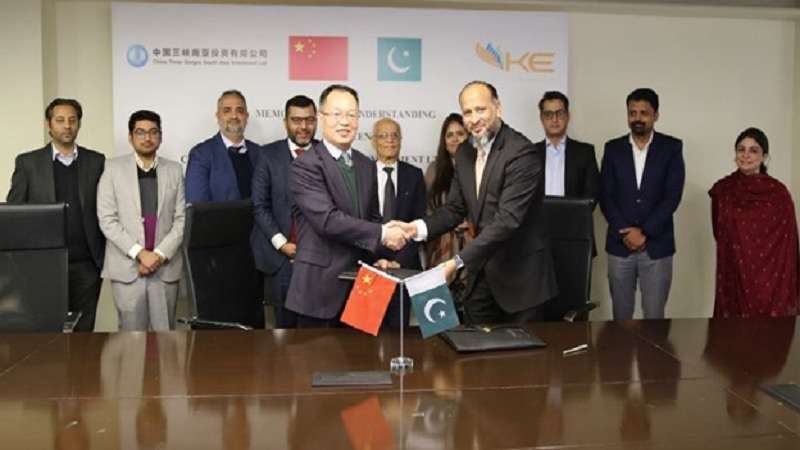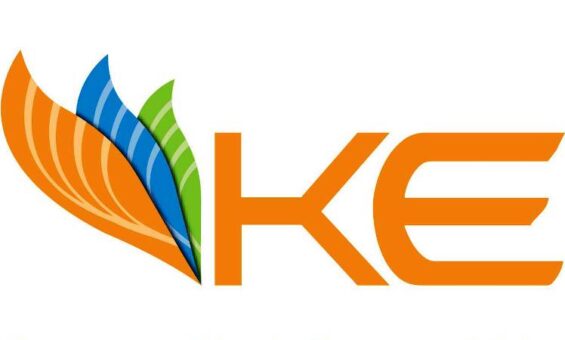KARACHI: K-Electric unveils a plan to invest Rs484 billion in transmission and distribution business, according to a statement issued on Monday.
(more…)Tag: K-Electric
-

Pakistan, China companies sign MoU to explore renewable energy projects
KARACHI: Pakistan and China companies have signed Memorandum of Understanding (MoU) for collaborate on exploring renewable energy.
(more…) -

K-Electric files suit against former member seeking Rs5 billion damages
KARACHI: K-Electric has filed a suit before Sindh High Court against a former member of Board of Directors demanding Rs5 billion as damages.
(more…) -

K-Electric seeks highest ever reduction in power bills
KARACHI: K-Electric has requested NEPRA to pass a reduction of PKR 10.26 per unit in customer bills under Fuel Charges Adjustment (FCA) for the month of December 2022.
(more…) -

K-Electric fails to improve power generation: NEPRA Chief
KARACHI: Touseef Hassan Farooqi, Chairman, National Electric Power Regulatory Authority (NEPRA) has said that K-Electric failed to improve power generation.
(more…) -

KE applies for providing relief to consumers in November electricity bills
KARACHI: K-Electric, the utility company, has filed a petition to provide relief to its consumers in the electricity bill for the month of November 2022.
A statement on Monday said that the company for the month of November 2022, it filed a petition for a reduction in Fuel Charges Adjustment (FCA) at the rate of PKR 7.04 /kwh (per unit).
NEPRA will conduct a public hearing today over the petition submitted by K-Electric on account of Fuel Charges Adjustments (FCA) for November 2022.
November’s FCA was lower primarily due to a reduction in prices of RLNG, Furnace Oil, and power purchased from CPPA-G by 18 per cent, 15 per cent, and 37 per cent respectively as compared to September 2022.
FCAs are dependent on changes in global prices of fuel and are passed on to consumer bills under the prescribed rules and regulations of NEPRA and the Government of Pakistan.
FCAs are approved by NEPRA after review who also specifies the month during which the charge is applied in consumer bills.
-

K-Electric sees positive outlook despite challenges
KARACHI: K-Electric, a power utility providing electricity to residential, commercial and industrial consumers of Karachi, is confident of positive outlook despite macroeconomic and geopolitical challenges.
“Despite macroeconomic and geopolitical challenges, KE is confident in serving its customers in a reliable and efficient way through a comprehensive, multi-pronged strategy,” said KE’s Chief Financial Officer Muhammad Aamir Ghaziani at a Corporate Briefing Session held at the Pakistan Stock Exchange (PSX) on November 22, 2022.
READ MORE: K-Electric posts huge losses despite 144% jump in tariff adjustment revenue
Sustained investments in the value chain have driven continued improvement in KE’s core business. Since privatization, KE has been able to reduce its transmission and distribution losses from approximately 34% to 15% at the end of FY22.
The utility’s transmission and distribution (T&D) losses have reduced by 2 percentage points at the end of the first quarter of FY23 compared to the same period last year, while generation efficiency has also improved by 0.6 percentage points during this time. Investment of around PKR 62.8 billion in FY22 and PKR 11.6 billion in first quarter of FY23 has been made across power value chain.
READ MORE: Faysal Bank, K-Electric collaborate to ease customer’s payment
KE is also preparing itself for the future. The panel shared plans to add up to 500 MW of efficient, clean energy in the short term to diversify the company’s fuel mix and lower the costs of electricity for the company and consumers alike. Simultaneously, construction works of Dhabeji and KKI grids are underway to allow KE to receive additional supply of up to 2050 MW from the National Grid.
On the distribution front, the company intends to enhance its infrastructure and continue its efforts to reduce distribution losses by rolling out Aerial Bundled Cables (ABCs) on its network and implement new and reengineered processes for an improved customer experience.
Speaking at the event, Sadia Dada, Chief Marketing and Communication Officer, also proudly shared KE’s multi-award winning corporate social responsibility strategy, which is driving grassroots development of the communities it operates in.
READ MORE: KE adjusts electricity bills under FCA relief package
The company shared highlights of its efforts including the installation of water filtration plants, renovation of schools and public parks, and setting up of health camps which have collectively benefitted approximately 200,000 persons.
KE’s flagship Roshni Baji Program also completed its 2nd cohort. Collectively 100 women have undergone training as KE’s neighborhood safety ambassadors as well as the country’s first certified female electricians. Collectively, these women have educated over 463,000 households on safe practices for electricity usage, building safer communities.
READ MORE: NEPRA acknowledges KE’s operational performance
Through different other partnerships, women are also being trained in financial literacy, self-defense, motorcycle operations, and CPR training. Continued awareness on safety through public service messaging has reached hundreds of thousands of people across Karachi’s high-risk areas as well.
The briefing also shed light on external factors which affected KE’s financial performance including, demand disruption due to macro-economic factors, receivables from the Government of Pakistan and related entities, devaluation of the Pak rupee resulting in exchange loss, increases in effective rates of borrowing leading to higher finance cost and increases in consumer tariffs which affected customer’s propensity to pay bills resulting in increase in the provision against doubtful debts.
The Company expects some in increase in growth due to shift of captive consumers to grid during the upcoming winter season and is also working diligently on conversion of captive consumers to grid in line with GoP’s policy as well as simplified New Connection process.
Aligned with the mission of brightening lives by building the capacity to deliver uninterrupted, safe and affordable power to Karachiites, KE will continue to make investments across the value chain, enabling the company to improve operationally whilst progressing on the value creation curve through innovation and technological advancements. However, support from government and regulatory authorities remain critical for the execution of the planned investment
-

K-Electric posts huge losses despite 144% jump in tariff adjustment revenue
KARACHI: K-Electric Limited, the electricity generation and supplier company, has declared huge after tax loss of Rs16.35 billion for the quarter ended September 30, 2022 massive jump of 144 per cent in revenue received through tariff adjustment.
According to consolidated financial results for the quarter ended September 30, 2022, the company announced after tax loss of Rs16.35 billion as compared with the after tax profit of Rs2.88 billion in the same period of the last year.
The company announced earnings per share at 59 paisas for the three months period ended September 30, 2022 as compared with EPS of 10 paisas in the same period of the last year.
Board of directors of KE met on October 28, 2022 to approve the financial results.
The company declared huge losses despite the massive jump in revenue from tariff adjustment. KE received Rs65.97 billion as tariff adjustment for the quarter ended September 30, 2022 as compared with Rs27.22 billion in the corresponding period of the last year, showing an increase of 144 per cent.
Total revenue of the company recorded at Rs154.58 billion for the quarter under review as compared with Rs114.17 billion in the same quarter of the last year.
Cost of sales increased to Rs146.53 billion for three months period ended September 30, 2022 as compared with Rs97.53 billion in the same period of the last year.
Company official said that the difficult socio-political challenge both locally and at international fronts, have had a consequential impact on the macro-economic factors.
The economic impact has reverberated through multiple channels, including commodity and financial markets, surging inflation, increasing policy rates and reduction in economic activity. Impacted by these challenges, the Company has observed a reduction in units sent-out by 8.9 per cent and the gross profitability of the Company declined significantly.
The company operates under regulated tariff and as per current Multi-Year Tariff effective from July 01, 2016, no adjustment is provided to the Company in tariff for changes in sent-out and policy rates. Further, the Company observed increase in exchange loss by PKR 2.6 billion owing to devaluation of Pak Rupee and increase in impairment loss by PKR 4.0 billion against doubtful debts due to high inflation, increase in consumer tariff, high FCA and current economic conditions impacting consumers propensity to pay.
The aforementioned factors along with increase in finance cost by PKR 3.4 billion mainly on account of increase in effective rate of borrowing and higher levels of borrowing due to non-payment of dues by Government entities, translated into the loss after tax amounting to PKR 16.3 billion.
The Company is geared up to face the challenges and focusing extensively on further operational improvements as detailed in the relevant business section and also working diligently for renewal of tariff for the next control period starting from July 01, 2023, with an aim to obtain a sustainable cost reflective tariff with robust adjustments mechanism at par with other power sector entities to ensure continuity of reliable and smooth service to consumers at least possible costs.
-

Faysal Bank, K-Electric collaborate to ease customer’s payment
KARACHI: Faysal Bank Limited (FBL), one of the leading Islamic Banks in the country, and K-Electric have come together to ease customer’s payment burden in times of economic crunch.
As part of the collaboration, Faysal Islami Noor Card holders will now be able to pay their electricity bills through easy instalment plan options of up to 3 months. Faysal Islami Noor card has gained immense popularity amongst industry card customers because it is a Shariah compliant alternative to conventional credit cards that offers amazing discounts and offers.
Speaking on the occasion, Head Consumer Finance (FBL), Aneeq Malik said: “Customer convenience has always been of paramount importance to the Bank and our partnership with K-Electric is a depiction of our commitment to our customers. We are confident that through the proposition will allow customers to manage their monthly expenditures in a more convenient and relaxed manner.”
Delighted at the launch of this campaign, Chief Distribution Officer at K-Electric, Amer Zia said, “Our collaboration with Faysal Bank through this offer is another testament of our commitment towards providing maximum relief to our consumers”.
Feroz Khan, Head Unsecured Business (FBL) further added, “We are committed to further building customer loyalty by offering the best in class products and benefits to our valued customers. This collaboration aims to ease customer expenditure on their KE billings specifically in the high billing periods.”
-

NEPRA acknowledges KE’s operational performance
KARACHI: A report published by National Electric Power Regulatory Authority (NEPRA) has acknowledged the improved operational performance of the KE, the utility company responsible for power generation and supply to Karachi.
The report, published annually by National Electric Power Regulatory Authority (NEPRA), also highlighted the longstanding issue of supply of low gas to K-Electric’s power plants at Korangi and SITE, which is affecting 200 MW of generation capacity for Karachi and leading to expensive power generation.
Through sustained investments, KE has been able to drive a significant reduction in Transmission and Distribution (T&D) losses, closing the financial year at 15.35%, lower than the regulator’s target of 15.95%. The utility has also been able to add over 250,000 new connections to its network bringing the total consumer base to over 3.4 million at the close of the fiscal year. Additionally, the number of units of energy served to these customers has also increased.
Commenting on the results, Director of Communications & Spokesperson KE, Imran Rana stated, “We continue to explore ways to improve our services for our growing customer base, and we are very pleased that KE’s operational improvement is being acknowledged in Power Sector’s credible annual performance report from the Regulatory Authority, NEPRA.
We look forward to carrying this momentum year on year, through increased digitization and automation of our processes and sustained investment across the value chain. We are also keeping our stakeholders – including the NEPRA Authority and the Ministry of Energy, Government of Pakistan among others – fully informed of the factors that continue to affect KE’s sustainability. Long delays in release of the Tariff Differential Subsidy (TDS) claims, and absence of supply of natural gas to KE are two important issues on top of the list that directly affects our ability to serve our customers.”
KE has also been actively developing a culture of regular bill payment and expanded its facilities to offer consumers convenient channels to clear their dues. Over the year, KE’s website has been integrated with NIFT ePay gateway offering real-time bill payment through interbank fund transfers.
Consumers can use the KE Live App to pay their bills from the convenience of their phones regardless of geographic location. Multiple banks and financial institutions have also been brought on board as partners offering cashback incentives and the option of converting utility bill payments on installments for certain credit cardholders.
Furthermore, KE is also engaging with area representatives at a community level for support in promoting a culture of bill payment and has also established multiple facilitation camps across the city to address and support billing queries. These efforts have resulted in improved recovery ratios which closed at 96.69%. During the same period, recovery ratios for DISCOs across the country dropped by 7 percentage points to 90.51%.
The company has also maintained a strong focus on safety, creating awareness on pertinent infrastructure issues including encroachment of constructed properties, the use of kundas, and unauthorized civil works carried across the city which create an unsafe environment for citizens. In addition to securing its infrastructure through earthing and grounding protocols, the utility continues to liaise with relevant civic agencies to ensure a safe and uninterrupted supply of electricity to the city. This has enabled KE to achieve a 28% reduction in safety related incidents within its territory. By comparison, safety incidents increased by 14% within state-owned DISCOs.
The report also commented on macroeconomic and other factors such as the devaluation of the Rupee against the US Dollar, delays in completion on power projects and outages of new power projects which exacerbated the cost of fuel procurement and raised the cost of electricity for the end-user. The report recommends a lot of measures for the improvement of power sector for Government to consider.